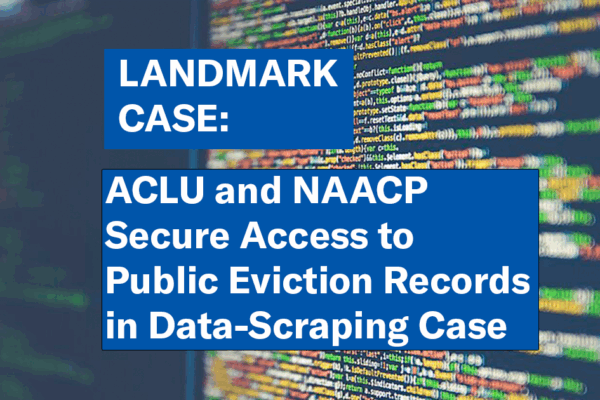COLUMBIA, S.C. — The South Carolina State Conference of the NAACP agreed to settle their landmark First Amendment litigation against South Carolina Court Administration in exchange for historical eviction records and timely access to all new eviction filings. The settlement concludes NAACP v. Kohn, a case that pressed for expansion of digital free speech rights and improved access to court documents.
The South Carolina NAACP will now have access to all of the public docket information it requires to provide services to tenants in eviction proceedings, and to engage in advocacy to enforce fair housing laws. The South Carolina NAACP was represented in the lawsuit by the American Civil Liberties Union, the ACLU of South Carolina, and the NAACP.
“At the heart of this case is our ability to help the thousands of tenants in South Carolina who face eviction every year,” said Brenda Murphy, president of the South Carolina NAACP. “With this agreement, we can begin the work of reaching out to tenants in our communities who have an eviction action filed against them, so that they know their rights and have a chance to connect with the services they need.”
"I am proud that we were able to vindicate important First Amendment concerns while also ensuring that the South Carolina NAACP has the tools it needs to conduct its important and urgently needed advocacy around South Carolina’s eviction crisis,” said Allen Chaney, legal director of the ACLU of South Carolina.
The lawsuit asserted that the Court Administration’s blanket ban on scraping the Public Index — the state’s repository of court filings — violated the First Amendment by restricting access to, and use of, public information, and prohibiting recording public information in ways that enable subsequent speech and advocacy.
“The district court properly recognized that the South Carolina NAACP’s proposed scraping of public court records is activity protected by the First Amendment. It is also a vital method of gathering public data efficiently, and enabling digital-era research and journalism in the public interest,” said Esha Bhandari, deputy director of the ACLU’s Speech, Privacy, and Technology Project.
“This case broadened First Amendment protections for the right to access important, public court records,” said Joe Schottenfeld, NAACP assistant general counsel. “And those protections served to secure the South Carolina NAACP’s efforts to reduce evictions across the state.”
Scraping is widely employed by researchers, reporters, and watchdog groups to capture and evaluate population-level data on websites that would otherwise be impracticable to thoroughly and quickly gather using manual methods. The South Carolina NAACP sought to scrape public housing court records so that it can identify tenants who have had eviction actions filed against them, to help them fight those eviction actions, and conduct statewide advocacy.
The state of South Carolina is in the midst of a statewide eviction crisis, with Black and women renters being evicted from their homes at disproportionate rates. Evictions result in cascading harms for tenants, their families, and the communities in which they live, leading to homelessness, negative impacts on health, poor educational and employment opportunities, and entrenched poverty.
To respond to the eviction crisis and its consequences for tenants, in February 2021 the South Carolina NAACP launched the Housing Navigator Program, which provides free eviction-prevention services, investigates and responds to community-wide patterns of eviction filings, and advocates for greater access to fair housing and more just eviction policies, including through Fair Housing Act litigation.
Stay Informed
Sign up to be the first to hear about how to take action.
By completing this form, I agree to receive occasional emails per the terms of the ACLU’s privacy statement.
By completing this form, I agree to receive occasional emails per the terms of the ACLU’s privacy statement.


